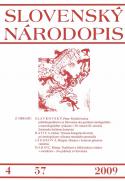Význam kategórie diverzity pri etnologickom výskume mestského prostredia
The Significance of the Concept of Diversity in the Ethnological Research of Urban Enviroment
Author(s): Dušan RaticaSubject(s): Anthropology
Published by: SAV - Slovenská akadémia vied - Ústav etnológie a sociálnej antropológie Slovenskej akadémie vied
Keywords: diversity; globalization; universality; social control; rural environment; urban environment; tolerance;
Summary/Abstract: The diversity, however covered under other conceptual expressions, has always played an important role in ethnological research, mainly during the process of capturing identical/analogous and differentiated cultural features of explored groups or societies. Universality and diversity can be understood as an essential complementary categories of ethnological research. The author brings up the question of relations between globalization and local cultural variety, which cannot be simply defined as unidirectional process leading to the “final” elimination of local diversity. The overestimation of recent acceleration of unification and universalisation ignores constant ability of culture to receive, incorporate and assimilate, or (on the other hand) eliminate elements of superlocal and superethnic provenance, and so to create the diversity in broader crosscultural context. The author further analyses the question of distinction between principles of social relations in rural and urban area. In urban environment the weakening of social control and dominance of formalised social relations can be observed. These factors, along with simultaneous individualization of way of life and maintenance of the continuity of group values, create conditions for the rise of social and cultural diversity. According to author´s opinion the diversity in urban environment can be generally explored by intra- and inter-object approach. The ethnological interest range from intra-individual (changes of value orientations of an individual in time) and inter-individual (differences of social status and interpretation, evaluation and acquirement of cultural elements among members of given group) to intra-cultural (local, regional or sub-cultural versatility) and intercultural diversity (mutual relations of separate ethnic cultures, minority - majority relations). The acceptance of inter-individual and intergroup diversity is leading (also in Slovak context) to some kind of basal tolerance, which results from concrete experiences confirming possibility of coexistence and cooperation of individuals and groups with different religious, ethnic and cultural background, as well as ideas of multi-, or inter-culturalism in the recent urban environment.
Journal: Slovenský národopis
- Issue Year: 57/2009
- Issue No: 4
- Page Range: 444 - 453
- Page Count: 10
- Language: Slovak

